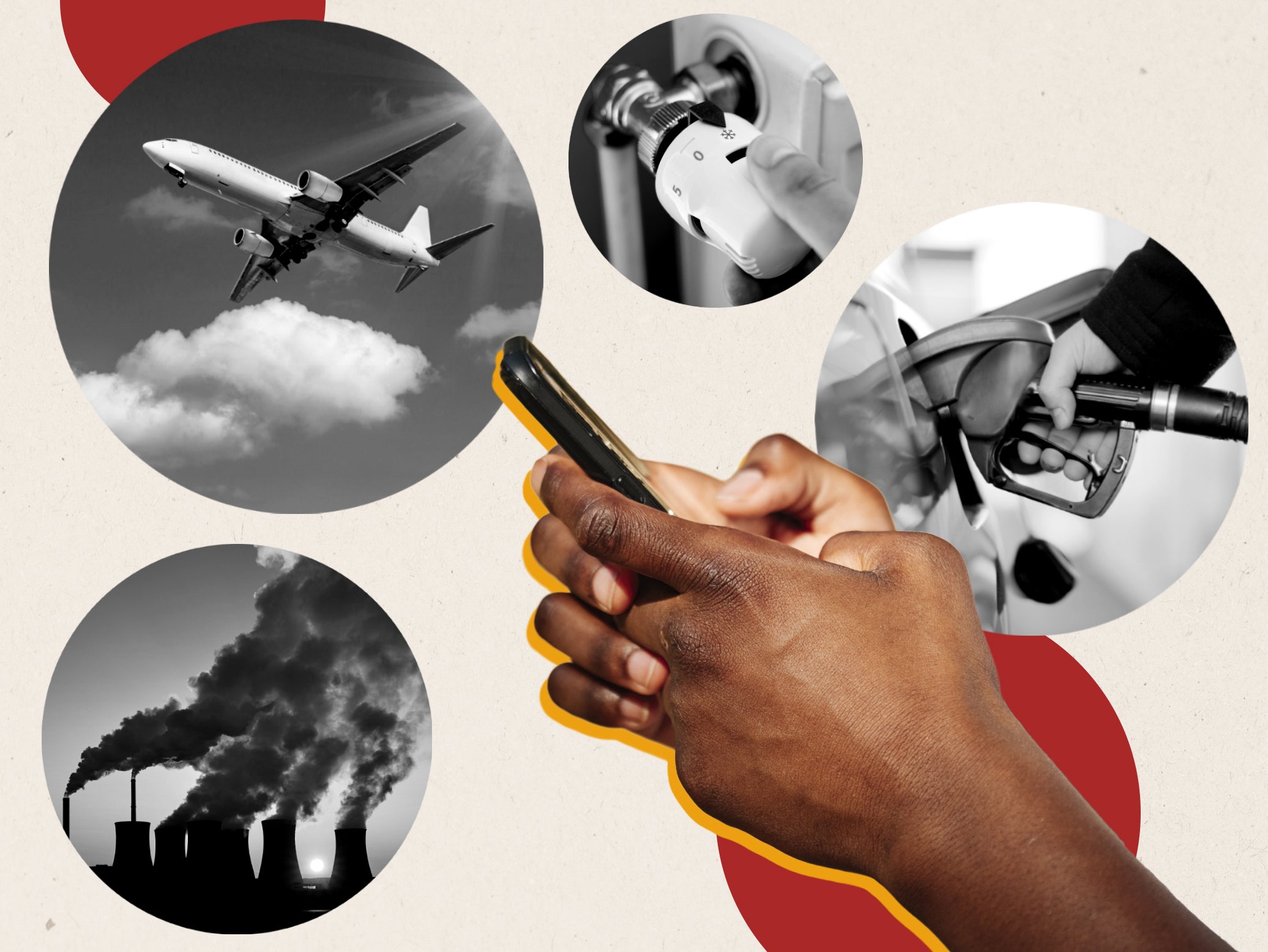Should everyone have their own personal carbon quota? Calls grow for emissions allowances
Advocates propose every person in UK be given a monthly carbon budget to balance between heating, travel, energy and food – but could something so radical ever work in reality, asks Colin Drury?


Your support helps us to tell the story
From reproductive rights to climate change to Big Tech, The Independent is on the ground when the story is developing. Whether it's investigating the financials of Elon Musk's pro-Trump PAC or producing our latest documentary, 'The A Word', which shines a light on the American women fighting for reproductive rights, we know how important it is to parse out the facts from the messaging.
At such a critical moment in US history, we need reporters on the ground. Your donation allows us to keep sending journalists to speak to both sides of the story.
The Independent is trusted by Americans across the entire political spectrum. And unlike many other quality news outlets, we choose not to lock Americans out of our reporting and analysis with paywalls. We believe quality journalism should be available to everyone, paid for by those who can afford it.
Your support makes all the difference.Your home, sometime in the next decade.
You click the heating on and receive an app notification telling you how much of your carbon allowance you’ve used today. Outside in the drive, your car’s fuel is linked to the same account. In the fridge, the New Zealand lamb you’ve bought has cost not just pounds and pence but a chunk of this monthly emissions budget too.
Welcome to the world of personal carbon allowances – a concept that is increasingly gaining traction among experts as a possible response to the climate crisis.
Each month, it would see every person or household in the country given a limited emissions quota to spend on heating, energy, travel, food and possibly consumer goods. Those who wish to expend more could buy top-ups. Those who require less would be able to sell their left-overs back to the ‘grid’.
Such a scheme, advocates reckon, would get more of us making the link between our own behaviour and global warming. Because consumers would seek greener energy, fuel and goods to stretch their allowance further, it could also help fundamentally restructure the economy in favour of low- or no-emission businesses.
“Individuals accounts for about 45 per cent of the UK’s carbon emissions,” says Dr Tina Fawcett, acting leader of Oxford University’s energy programme and a researcher who has spent almost 20 years studying this concept. “Personal budgets could be a relatively simple, straightforward tool for reducing that.”
Now, in the wake of Cop26, many feel the concept – radical, perhaps, but demonstrably do-able – has never been riper for consideration. So, could this be our future?
Personal carbon allowances are not, it should be said, a new idea.
Academia started exploring the possibilities of such schemes in the late 1990s, while between 2006 and 2007, the then environment secretary David Miliband commissioned two reports into their potential use. The concept, he enthused, had a “simplicity and beauty that would reward carbon thrift”. In those days it was not an app that was envisaged but a carbon credit card.
In the intervening years, a number of local authorities, including Oxford City Council, have explored if such schemes could work regionally. In the Finnish city of Lahti, a voluntary scheme for transport use has widely been praised. Crucially, amid rising concern about global warming, studies suggest there is anecdotal evidence of a growing public willingness to embrace personal limitations
“They two key issue for people tend to be: can it be implemented fairly and can it be implemented effectively,” says Fawcett. “If both those questions can be answered yes, the idea that people can then manage their own allowance in accordance with their own priorities does appear to have appeal.”
While there is no real agreement on how a UK-wide scheme would work, proposals tend to share certain common characteristics. it would be mandatory, it would cover energy and transport at the very least and possibly food and consumer goods; allowances would be tradable to reward lower use; and the quotas would, ultimately, be reduced over time to reach net zero.
Technologically, most agree the idea is achievable. It may be more difficult than creating, for example, a vaccine passport – but not hugely so.
This perhaps means the whole idea comes down to a question of political will.
For Fawcett and other supporters – which includes the Green Party – this should be a no-brainer. CPAs, they say, would drive our behaviour by appealing to both our self-interest – that is to say our pockets – and to our sense of community.
“By establishing an equal monthly budget for everyone, you create a sense of a shared effort to address a shared problem,” says Fawcett.

Yet others who are equally interested in reducing carbon use are less convinced that this is a suitable way forward.
“As a thought-experiment, it’s interesting but I think people have got carried away without necessarily thinking of all the practicalities,” says Simon Roberts, chief executive at the Bristol-based Centre for Sustainable Energy. “The problem is the effort required to deliver something like this creates almost insurmountable obstacles. There are a lot of other ways to achieve very similar outcomes – getting carbon down – that are more in line with what we already know how to do.”
His view is especially worth considering because he was one of the co-authors of the 2006 report for the Labour government’s Department for Environment, Food and Rural Affairs. Back then, he concluded that CPAs came with numerous issues – and, in the 15 years since, he has not seen anything to convince him otherwise.
“By focusing too much on individuals, you expend a huge amount of time on something that only tinkers around the edges of reducing carbon emissions,” he says. “We should be focusing on systemic changes that would have far greater impact, such as shifting the supply chain from gas boilers to heat pumps.”
In particular, he reckons, the bureaucracy needed to create a CPA system would be both fiendishly costly and fiendishly difficult. If both travel and food were included in the allowance, he’s not even sure it could be done. How could one have a scale which somehow quantifies both buying beef burgers from Tesco and a 90-mile car journey?
More pertinently, perhaps, is the idea that, while some people support the idea in principle, in practice it would add yet one more burden in life to deal with.
“My view is that this is a bit of a preoccupation of people that think that we should be able to do everything through markets,” says Professor Rob Gross, director of the UK Energy Research Centre. “In real life, what I think would happen is that it becomes another layer of complication for people who, a lot of the time, already feel bombarded with having to sort things out: broadband suppliers, mobile contracts, electricity bills.”
For critics like Roberts and Gross, far better ways to reduce carbon use would come through more systemic change: heat pumps and electric vehicle subsidies, an end to all fossil fuel expansion in the UK and – crucially – a carbon tax.
“This is something that could be done almost instantly,” says Roberts. “That’s where we should be putting in the hard yards. If you add a carbon consumption tax to consumer goods, for instance, then goods produced using lower carbon systems become cheaper, which encourages more people to buy them instead of their competitors. That would drive change without having to work out something that is politically difficult to swallow for so many people.”
So-called nudge policies could also be better employed, some reckon. Carbon counts on restaurant menus and rewards for using public transport are among a raft of ideas that have been put forward to influence people’s behaviour.
All of which suggests the debate over the relative merits of CPAs is only set to continue.
Yet perhaps that debate is, in itself, a sign of progress.
Fifteen years ago, when Labour first looked at this, the argument tended to revolve around whether restricting individual carbon use was even necessary. Today, such a need for personal limits is, it seems, almost universally accepted. The question now is how best to achieve it.

Join our commenting forum
Join thought-provoking conversations, follow other Independent readers and see their replies
Comments